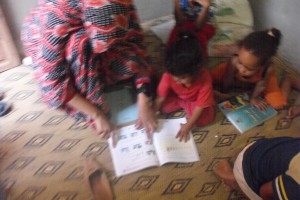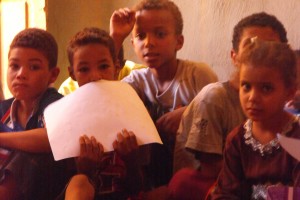Social and cultural context
Children’s conditions
Main problems of Sahara children:
Poverty
The 15 % of the Moroccan population lives below the poverty line (with less than 2 dollars a day).
Poverty which affects mainly the rural areas, tends however to decrease thanks to the social actions led by the Kingdom of Morocco.
Health
Moroccan children’s mortality rate with less than 5 years is 38 %. It is however necessary to specify that Morocco realizes in this domain of the important progress to reduce this percentage.
Morocco is committed in increasing and improving its sanitary structures and services in order to allow all the children to have the right to life.
Child labor
In Morocco, many families suffer from difficult living conditions and live in the great poverty, especially in the regions of the South of the Country. The most vulnerable victims of this poverty are children , who are then forced to drop the school and to go to work to support their families.
In Morocco the work of the minors still affects 8 % of the young people between 5 and 14 years, phenomenon which touches more generally the girls who stay at home rather than continuing the studies.
All this augment the possibility that these children could be exploited starting from their youngest age.
Education of children
Today only 88 % of Moroccan children are schooled while since 2002 the school is compulsory and free for all the children aged from 6 to 15 years old.
Although the school is free, the parents living in the poverty cannot pay the expenses for books, notebooks, transport (schools in rural areas are often far from the house) and stationery. The poor families are sometimes forced to send their children to work so that they bring back some money to the household. Approximately a child out of two aged more than 10 years is an illiterate.
Efforts were realized by the Morocco Government to allow the access to education for all children. These efforts go together with the sensitization operated by the Moroccan civil society which is engaged to make effective the objective of schooling for all.
The children of M’Hamid
The children saharaoui of M’hamid, targeted by the Association, mostly aged between 5 and 12 years, follow the primary school of M’hamid. It often happens that the quality of the education don’t give enough skill-development to children, who lose their interest in their school career due to different reasons (lack of the school equipment, lack of economic support, lacks of self-confidence etc.)
The population comes from rural context, and it is mainly illiterate and uneducated.
In the district the low-income families are experiencing the rural-urban migration condition with a sense of deprivation and marginalisation. The children coming from this social context cannot enjoy from any place for playing and studying.
All this contributes to the dropping out of school, and, as a result, to the marginalisation of children.
We are persuaded that these children need to be supported, we want to give them a means to exteriorize their needs and fantasy in a space exclusively for them. With the aim of giving another chance to the children of schools by offering them attractive, playful activities and also to bring after school courses to strengthen their attachment to school and improve their concentration for being successful in primary school.
Women’s conditions
 Most important problems of Sahara women:
Most important problems of Sahara women:
Women are most vulnerable to the problem of poverty, given the dependence of access to education, to work, to the control of the power and resources. Rural women, illiterate women and divorced or widowed women are most vulnerable to the problems of poverty, and they are often reclused to activities within the family circle.

Patriarchal values, unequal access to resources, cultural resistance to the work of women, low level of education of women (according to the Ministry of Education National Morocco, rural female adult illiteracy level tragically exceeds the 70% out of total population), the limited capacity of insertion in the labour market, the difficulties encountered by women in balancing their identity between public and private life, all these contribute to the marginalization of women in Moroccan society.
The association has the objective to give women Saharawi de M’Hamid an space for developing their education and competences through Arabic and French classes.

